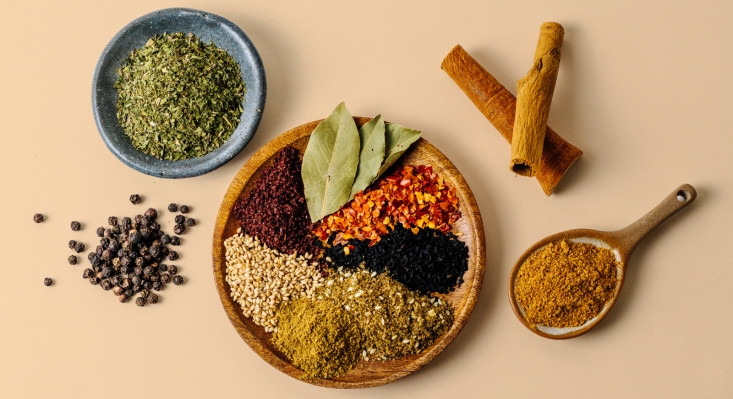[ad_1]
Berlin-based Yababa only started its same-day grocery delivery business this summer and shortly thereafter sold products that catered to the tastes of the capital's large Turkish and Arab communities, but in a few months it had a starting round of 15, US $ 5 million completed in funding to support the planned rapid expansion – both within Germany and throughout Europe.
“Paris, Amsterdan, Brussels, London”, says co-founder Ralph Hage and unwinds the list of the likely first candidate cities for his service outside Germany.
In Germany, he says, Cologne will be next to Berlin – where it currently delivers to Mitte, Prenzlauer Berg, Friedrichshain, Kreuzberg, Moabit, Wedding, Neukölln, Charlottenburg, Wilmersdorf, Tiergarten, Tempelhof-Schöneberg and Lichtenberg – either by the end of this year or early next year. In addition, the service is to go live in seven German cities in 2022.
Expanding Yababa's product mix to appeal to a wider mix of multicultural communities is also on the agenda. But the most popular item ordered in the German capital is initially Arabic bread, followed by meat, fruit and vegetables, according to the startup.
Although it starts with a focus on Turkish and Arabic foods, it nonetheless sells a wide variety of foods – from fresh lemons to lunch meats to frozen pizza and cleaning products, to name a few of its current ~ 1.5k SKUs. And a much more extensive inventory is in preparation.
Yababa's seed round is led by Creandum and Project A, with the existing investor FoodLabs also participating along with a number of business angels.
While fast-selling (or instant grocery) has grown like a weed across Europe in recent months – fueled by the shock of the pandemic, Europeans' grocery shopping habits are moving away from personal business to (socially distant) app-based shopping; This in turn is exciting regional investors drooling at the prospect of disrupting traditional brick and mortar supermarkets, so the funds fall on themselves to big bucks in speed-oriented digital platforms like Getir from Turkey, Glovo from Spain, Gorillas from Germany and the US GoPuff (to name a few); the convenience game begins to give way to more interesting market segments – catering to the food needs and niches of certain communities.
See, for example, the ethnically-focused London-based Oja – whose seed round we covered last month – or the local food producer platform Membo, an Estonian startup that has bagged funds from Y Combinator to build a marketplace model of connecting shoppers with local quality producers, to name just two.
Yababa believes that such developments are a sign of the "validation" of the market – and at the same time argues that, given the still relatively low level of competition, there is a great opportunity to build a leading pan-European platform for grocery shopping that is responding to targets underserved multicultural communities. (And by the way, 'Yababa' is a casual greeting that you will likely hear when you go to an Arab supermarket in person.)
If you think that “niche” means a market that is too small to be significant, Hage points out that in Germany itself more than a fifth of the population has a migration background (the majority is from Near East). And there are many other large diasporas living in countries across Western Europe – communities that Yababa is preparing to grow and serve.
"Today we are clearly filling a massive gap for our investors, our stakeholders and our customers," he told TechCrunch. “There is a huge opportunity on the investor side – we are one of the first players on the market today. It has been validated in the USA at companies that concentrate on the Asian segment. "
"As we expand across Europe – because we see the same problem in France, Benelux, UK, etc. – we are expanding into other ethnic groups," he adds. "This is how the business model will develop."
As on-demand grocery delivery start-ups become more novel / specialized, the need for bubble-forming speed as a differentiator is of course reduced. Convenience here comes from having the products (and quality) they are looking for that are simply more difficult for your customers to find through more traditional retail (or less specialized) grocery shopping channels.
This in turn means that platforms like Yababa can get by with perhaps only one central warehouse per city instead of stocking a location with dozen of mini-dark stores – because the delivery promise is usually “the next day” (and not within Minutes).
This means that the logistics element compared to Q-Commerce platforms such as Gorillas et al. Seems to be easier to streamline (and maintain) (meaning that potentially less investor money is burned). However, in the case of Yababa, it is clearly in a hurry to scale up to steal the advance of other multicultural newcomers, and this requires sufficient resources, hence the large seed increase.
A slower delivery model can also mean lower risks to the conditions of the delivery workers – i. H. because you do not impose inhumanly fast turnaround times. And platform worker conditions are an area of active legislative attention in Europe; and one in which Q-Commerce platforms like Gorillas and Glovo continue to face a hodgepodge of challenges.
“We don't focus on speed,” confirms Hage from the grocery delivery service himself. “Basically, our USP is not about how fast we deliver a product. Of course we think the same day is very important and we think convenience is just as important for the customer, but we want to offer an affordable service instead of charging customers a few euros for delivery – because we think this is a causes little friction. the market. "
“Our model is closer – I would say – to AmazonFresh and Picnic. Where we basically allow a customer to choose a delivery date and the time of delivery – and today we deliver within a two-hour window, ”he continues. “Over time this may decrease – in [a more] faster [service] – or we may offer customers who want their products quicker the option to pay a delivery fee. But at the moment the model is closer to AmazonFresh and Picnic. "
"All the customers we spoke to – all customers who buy from us today – appreciate the range and the quality of the products through the speed of delivery," he adds.
“Our stores are basically ours – it's a dark warehouse model – yet they are bigger than the high-speed warehouse because we're going to expand our SKUs from 1.5k to 5k today. And we don't need as many warehouses in the city as the quick commerce player. ”
Even though Yababa has the relative luxury of (fairly) relaxed delivery times (compared to instant groceries / Q-commerce), Yababa still tries to keep control of the delivery experience. So while it procures delivery staff through third party companies, it takes care of their training, and Hage also says it aims to recruit from the same communities it targets in order to provide the best match between delivery person and customer.
The founding team of Yababa meanwhile brings a lot of seasoned experience from previous roles in on-demand grocery and logistics companies.
For example, Hage previously held executive positions at the grocery delivery company Delivery Hero and the digital insurer Wefox – including the co-founders of NokNok, a 10-minute grocery delivery company operating in the Middle East.
He also states that he himself has a migrant background and a Middle Eastern background, since he was born in Beirut.
Yababa co-founder Ralph Hage (Photo credit: Yababa)
Yababa's other co-founders are also experienced in logistics: There is Hadi Zaklouta (also ex-Delivery Hero); Javier Gimenez (previously at the e-scooter startup Tier Mobility); and Kamel Semakieh (whose career history includes co-founding a delivery logistics platform in Lebanon).
"One of the most important things today is that nobody has time to study," says Hage when asked what experiences the founding team brings with them from their previous work stations. “You need to have people on your team who already have context. People who have done this before in the areas they focus on today.
“If you look at the founding team today, they are people I know and with whom I have worked in the past. So I understand exactly what their abilities are, their abilities, how they work, and today we can work very closely together – we have a certain level of trust and we solve problems really well together. "
In view of the European online grocery market sizzling with investor money and fierce competition (not to mention a lot of consolidation), the question arises whether Yababa is building a business in the long term – with the aim of an eventual IPO – or on one Hoping for a quick exit to one of the convenience-focused food app giants who are likely to be on the lookout for fresh segments if / when convenience growth slows down?
After all, Delivery Hero has already gotten a piece of gorillas – the on-demand hot meal platform that led its Series C round last month.
"Look, if we know anything about this market – food or grocery – is that it will lead to a consolidation," says Hage. “It has consolidated over the years, and this is one of the things I've done for Delivery Hero in the Middle East – I've done M&A integrations for them as part of my role – and that's something I definitely understand . And it's part of my positioning of the company. But my goal in building this company is not to sell it in a year.
“From a business perspective, this is not the most profitable or strategic decision, neither for our stakeholders nor for us as a team. A lot of hard work to start a business today and we want a brand that will become a household name and will last for the next 10 years.
“Whoever invests in us or whoever is interested in acquiring us – I think this is just a vote of confidence and something we will appreciate and admire when we get this far. But we're not building a company with the goal of selling it in a year. And that is not the reason why our investors want to work with us. "
The fleshy size of the seed elevation is a measure of Yababa's ambition to scale first – and, according to Hage, to scale quickly.
“We want to achieve a few things with the next round. Expansion is one of them. With the fresh capital, we basically want to go beyond Germany relatively quickly – we firmly believe that there is an opportunity for land grabbing in this business today and we want to ensure that we are well positioned in the cities that make sense for us depending on where our customers are and the communities we want to address are, ”he says.
“We are going to build a network of warehouses. We want to expand our range. And make sure that we not only serve customers products that they know and find in Germany today – but also more exciting products that they know from home and that do not exist in Germany. So we'd like to focus on making sure we have more and more relevant products over time – identify gaps in supply and find out where we can get them from. Because this is one of the most convincing and most important parts of our job – offering people products that they really want and that they miss from home.
“And of course we are scaling our supply chain – from a technical and operational point of view – and expanding the team. We want to hire some of the best people in Europe today and we are building a fantastic culture so far. And it is important for us to make sure that we continue this culture of excellence that we started with. ”
While Yababa obviously differs in the mix of products on offer, Hage says it will also do more to differentiate its app experience from more vanilla / western grocery shopping services – for example by localizing voice content.
"There are different phases for the app itself," he says. “Today we work much like other grocery or grocery delivery apps – so the experience is pretty familiar. Nonetheless, the plan is to localize the experience so we are now in the process of translating into the local languages of the audiences we serve. And I think this is an extremely important element in what we're trying to build – not just on the app itself, but also on the customer service and the drivers. "
There will also be a more nuanced taste for the app experience – but Hage is keeping Yababa's plans in this regard a secret for the time being and only says: "Over time, we will develop more exciting functions that customers would love."
“Personally, I have a great connection with the product I build today,” he adds. “Personally, I come from the Middle East – I was born in Beirut at a very difficult time, moved away from home super early – I started working at a very young age and have been traveling to countries since then. Lived in many different places and took this idea from home. For me, food was the most obvious thing I have at home – and I've always wanted to build a product where I can show how special the food and the different cuisines are in the region in which I come from western market. So if we basically bring these two ideas together, we have Yababa today. "
Update: Peter Specht, partner at Creandum, commented on the funding in a statement: "We have seen a number of rapidly growing generalist and convenience grocery providers recently, but the multicultural food segment are still overlooked in Europe. Just as the offline world is a differentiated market with verticalized dealers, suppliers and customer needs, we see the same trend on the digital side.
“The Yababa founders impressed us with their vision, expertise, and close community connections – as well as their track record in high-growth food delivery startups. We are proud to support Ralph, Hadi, Javier and Kamel in building the European market leader. ”
In another supportive statement, Anton Waitz, General Partner at Project A Ventures, added: “Multicultural grocery shopping is an underserved and very fragmented market that differs widely from city to city and district to district. The great and experienced Yababa team has set itself the task of enriching the everyday lives of millions of people in Europe – not only with the best possible shopping convenience, but also with a truly unique range of groceries. "
[ad_2]
Story continues…



